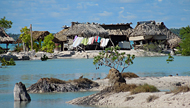Integration of gender aspects into climate change adaptation and low-carbon developmen
The project was working to mainstream the gender dimension in climate change adaptation and low-carbon development (LCD) measures in developing countries and in national and international climate policy. It provided training for representatives of community-based and non-governmental organisations and government employees on gender-sensitive adaptation and LCD measures, and supported this work with corresponding information and training materials. In addition, the project developed indicators and methodologies for strengthening and monitoring gender-sensitive adaptation measures and formulates proposals for political strategies.
- Countries
- Bangladesh, Kiribati, Marshall Islands, Nauru
- IKI funding
- 451,339.00 €
- Duration
- 11/2010 till 01/2014
- Status
- completed
- Implementing organisation
- GenderCC - women for climate justice e.V.
- Political Partner
-
- Centre for Global Change (CGC)
- Secretariat of the Pacific Community (SPC)*
- Implementing Partner
-
- Centre for Global Change (CGC)
- Secretariat of the Pacific Community (SPC)*
State of implementation/results
- Project completed
- Campaign launched to raise public awareness of gender issues and climate change; posters developed and widely distributed in Bangladesh and Pacific Island States; issue has received newspaper coverage
- Expert advice provided to governments: gender analysis of the national climate change strategy and action plan of Bangladesh carried out; gender dimension integrated into national policy processes in the Republic of Marshall Islands, Tuvalu and Bangladesh.
- Training courses developed on gender-sensitive adaptation and reduction of emissions; educational materials produced and trainers trained
- Gender issues raised at international climate negotiation conferences (COPs) through official submissions and organization of high-level side events. Since 2012 the COPs are regularly working on gender equality (e.g. the gender decision at COP 17 in Doha)
- Implementation of pilot projects with government representatives, NGOs, local communities, women and youth. The pilot projects focused on alternative livelihoods of people impacted by climate change as well as water security and energy-efficient cook stoves
- Web platform for global learning and exchange launched
Latest Update:
12/2025
Project relations
Legend:
The link has been copied to the clipboard




